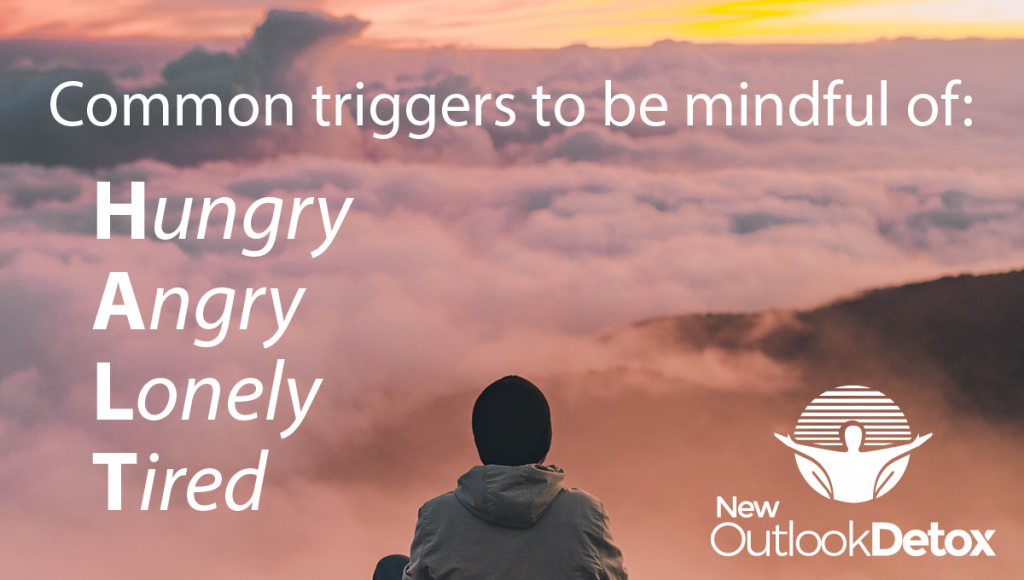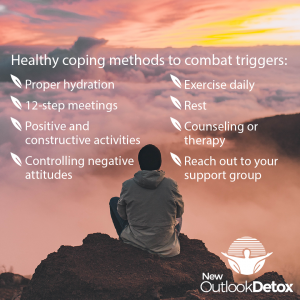
Know Your Triggers
Triggers have a social, environmental, or emotional reaction that reminds the addicted person of their past drug and alcohol use. When a trigger arises, it brings along with it the urge to relapse. Some of the triggers will be external: people, places, harmful substances, and even scents that remind them of intense or distracting emotions.
Internal triggers create a more significant challenge to manage than external triggers. They bring with them thoughts, feelings, or emotions that are associated with substance abuse. The key lies in being aware of what the triggers are and being willing to seek support when needed.
HALT: Hungry, Angry, Lonely, Tired
The helpful acronym HALT stands for the four states that commonly trigger drug cravings. They are relatively concrete to identify and are a great place to start when first practicing coping with triggers:
- Hungry: Sometimes, when you are stressed or occupied, it can easy to miss when you are feeling hungry. If you are feeling an unexpected craving, stop and remember the last time you ate and whether it was nutritious. Dehydration can be a big influence on your moods as well so drink a cool glass of water if it’s been a while or you’ve only been drinking coffee or sodas recently.
- Angry: Everyone gets frustrated or angry from time to time, and if you don’t stop to think about it, feeling anger can lead you to start thinking about drugs as the “easy” way to make it stop. Focus on your breathing and count to 10 to help separate the emotion from impacting your actions. Any feeling you experience is valid, but anger often needs time to cool before you can address it in a positive way.
- Lonely: When you don’t have or aren’t participating in a support network, you lose some of the accountability you get from others. Being lonely or isolated may also tempt you to fill the social void with drugs. Online groups focused around hobbies you enjoy or support groups are great ways to be social with many people while remaining anonymous if you’d prefer. Just avoid the toxic groups!
- Tired: Being tired can heighten all negative emotions and thoughts, including drug cravings. Getting enough sleep isn’t always easy, but it should be a priority, especially in the early days of recovery. Broken sleep isn’t as restful as full REM sleep, look for solutions to make sure your night is uninterrupted and as restful as it can be with eye masks, earplugs, calming bedtime tea, reducing screentime, and more.
Healthy Coping Methods
The most important thing you can do for yourself and your recovery is to be self-aware. What is the force that drives you into that addictive behavior? Learn to control the trigger before it becomes a reason to relapse. How do you manage your triggers? Here are some healthy ways:
- Exercise daily
- Rest
- 12-Step meetings
- Reach out to your support group
- Counseling or therapy
- Proper hydration
- Positive and constructive activities
- Controlling negative attitudes
Be Honest with Yourself and Others
Did you know that if you are lying to yourself, you are also lying to others? Be smart, not strong. Everyone has emotional triggers. If something bothers you, do not act like it doesn’t. You will be off-center for the rest of the day. Express in a loving and caring way how you are feeling. The safest place to do this in early recovery is in a 12-Step meeting with your support group or your counselor.
Your loved ones deserve the chance to fix any behaviors they have that bother you. If you avoid talking about it, you’re making someone hurt you unintentionally. Wouldn’t you want to know if you’re accidentally hurting your friend or family? What may seem like a hard conversation could lead to a deeper and more trusting relationship.
Keep a Daily Journal and Gratitude List
 The best way to deal with negative feelings is to journal. Write a gratitude list. The simple habit of reflecting on everything you have to be grateful for leads everyone to a happy and more content life.
The best way to deal with negative feelings is to journal. Write a gratitude list. The simple habit of reflecting on everything you have to be grateful for leads everyone to a happy and more content life.
If you have trouble keeping this habit start each morning with 5 minutes to pick a self-improvement activity you’re looking forward to for the day. By choosing one activity in the morning, you are prioritizing your self-care and giving yourself something to look forward to throughout the day.
Ideas for activities:
- Follow a guided meditation
- Do 15 minutes of yoga
- Take a walk over lunch
- Call a friend you haven’t talked to in a while
- Try a new healthy recipe
- Invest some time in your hobby of choice
Take time at the end of each day to think about good things that happened. These don’t need to be monumental “I got the job!” types of things. Focus on the simple pleasures of daily life:
- The sun shining on your skin
- Catching green lights on your way home
- Drinking a comforting cup of coffee or tea
- Catching sight of animals in the wild
- Enjoying a new episode of your favorite show
- How many days you’ve been sober
We all have things to be grateful for and by taking the time to reflect on the good things we will begin to notice them more during our day-to-day lives. If you keep a gratitude journal, this is a great resource to look back on during a moment of weakness. What were you grateful for previously? Can you still find that gratitude inside you? Reconnect with it and let those positive feelings raise you from the negative depths.
Set Boundaries
Learning to set boundaries for ourselves in early recovery can be difficult, at first. By the time the addicted person makes it into recovery, most of us have already walked through every boundary we have ever set for ourselves. That is alright. The important thing is you are aware and you learn to set them again. Talk to your sponsor about it. That is what he or she is for and I would be willing to bet they have had the same experience in early recovery and know exactly where you are!
Our emotional triggers are sometimes the result of not setting boundaries and letting others know what they are. Boundaries tell people what you will and will not allow. They also set limits on what you will and won’t do. Boundaries are allowed to change, and you will have different boundaries for different people in your life. If someone can’t accept your boundaries take a step back from that person until they can. Your healing is more important than their need to cross your boundaries and you deserve respect.
Develop a Strong Support Network with Other Recovering Addicts
Building a recovery network is very important. Spending time with positive people who live life without drugs and alcohol, and supportive of you doing the same provides several benefits, including:
- Accountability for choices in recovery
- Encouragement to continue sober
- Support if craving return
- Shared experiences in recovery
- The opportunity to help others and support them on their healthy path
By spending time with positive people, the positive choices become normal, and the less likely you’ll turn back to drugs and alcohol to cope with stress, anger, boredom, and other issues that may arise.
Contact New Outlook Detox Today!
No matter how lost you feel, you have the power to turn your life around. We are here to support you throughout your journey.
Our trained staff will attend to your needs and help give you the tools for recovery and sober life. With the right support and treatment, your entire life can take a turn for the better. If you have any questions or concerns, don’t hesitate to give us a call. You can contact us here to begin your recovery journey today.


